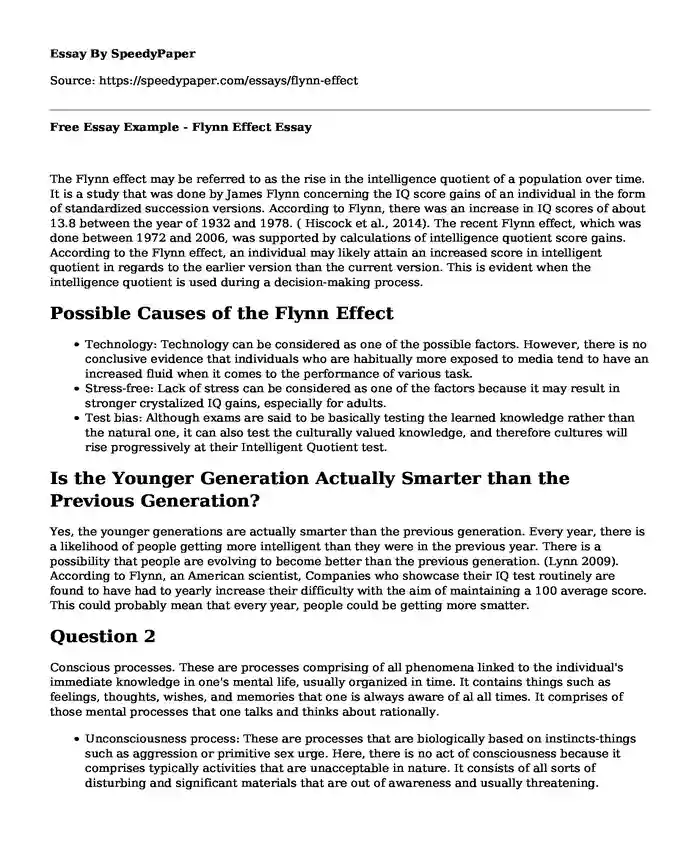
| Type of paper: | Critical thinking |
| Categories: | Knowledge Intelligence Personality Human development |
| Pages: | 3 |
| Wordcount: | 655 words |
The Flynn effect may be referred to as the rise in the intelligence quotient of a population over time. It is a study that was done by James Flynn concerning the IQ score gains of an individual in the form of standardized succession versions. According to Flynn, there was an increase in IQ scores of about 13.8 between the year of 1932 and 1978. ( Hiscock et al., 2014). The recent Flynn effect, which was done between 1972 and 2006, was supported by calculations of intelligence quotient score gains. According to the Flynn effect, an individual may likely attain an increased score in intelligent quotient in regards to the earlier version than the current version. This is evident when the intelligence quotient is used during a decision-making process.
Possible Causes of the Flynn Effect
- Technology: Technology can be considered as one of the possible factors. However, there is no conclusive evidence that individuals who are habitually more exposed to media tend to have an increased fluid when it comes to the performance of various task.
- Stress-free: Lack of stress can be considered as one of the factors because it may result in stronger crystalized IQ gains, especially for adults.
- Test bias: Although exams are said to be basically testing the learned knowledge rather than the natural one, it can also test the culturally valued knowledge, and therefore cultures will rise progressively at their Intelligent Quotient test.
Is the Younger Generation Actually Smarter than the Previous Generation?
Yes, the younger generations are actually smarter than the previous generation. Every year, there is a likelihood of people getting more intelligent than they were in the previous year. There is a possibility that people are evolving to become better than the previous generation. (Lynn 2009). According to Flynn, an American scientist, Companies who showcase their IQ test routinely are found to have had to yearly increase their difficulty with the aim of maintaining a 100 average score. This could probably mean that every year, people could be getting more smatter.
Question 2
Conscious processes. These are processes comprising of all phenomena linked to the individual's immediate knowledge in one's mental life, usually organized in time. It contains things such as feelings, thoughts, wishes, and memories that one is always aware of al all times. It comprises of those mental processes that one talks and thinks about rationally.
- Unconsciousness process: These are processes that are biologically based on instincts-things such as aggression or primitive sex urge. Here, there is no act of consciousness because it comprises typically activities that are unacceptable in nature. It consists of all sorts of disturbing and significant materials that are out of awareness and usually threatening.
- Consciousness processes: It consists of those processes that drive biological behavior. It is about awareness of one's unique thoughts, feelings, environment, and sensations.
- Hypnosis: It can also be referred to as hypnotherapy, which is a state that one has concentration and heightened focus. It is usually done with the assistance of a therapist and involves the use of mental images and verbal repetition.
- Sleep: It is a state of relaxation characterized by a state of consciousness that has been altered, muscular inhibition, and inhibited sensory. It alternates between rapid eye movement (REM) sleep whereby dreams occur. It is an essential process in the human body, especially in the brain. Without sleep, one cannot maintain or form the pathways in the brain that will let one create fresh memories, and it becomes harder for one to even respond quickly or concentrate.
- Dreams: These are successions of ideas, images, sensations, and emotions that involuntarily occur in one's mind at certain stages during sleep. It mainly occurs in REM (rapid-eye movement) when the activities in the brain resemble that of an awake person.
References
Lynn, R. (2009). What has caused the Flynn effect? Secular increases in the Development Quotients of infants. Intelligence, 37(1), 16-24.
Trahan, L. H., Stuebing, K. K., Fletcher, J. M., & Hiscock, M. (2014). The Flynn effect: A meta-analysis. Psychological Bulletin, 140(5), 1332.
Cite this page
Free Essay Example - Flynn Effect. (2023, May 02). Retrieved from https://speedypaper.net/essays/flynn-effect
Request Removal
If you are the original author of this essay and no longer wish to have it published on the SpeedyPaper website, please click below to request its removal:
- Free Essay on Developing a Sustainable City Model for Port Louis
- Essay Example: Captain Sullenberger Research
- Free Essay on the Film and Novel "The Big Sleep"
- Essay Example: Proposal for the Adoption of Renewable Energy and Green Power in the United States
- Reflected Best Self - Leadership Development Essay Example
- Free Essay: Exhibition Visit and Written Response
- Free Essay on the Space of the Text in The New Dress: Literary Form and Structure
Popular categories




